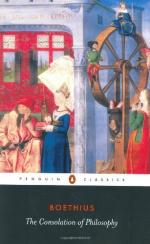|
This section contains 10,100 words (approx. 34 pages at 300 words per page) |

|
SOURCE: "Language and Loss in Book Three," in Boethius and Dialogue: Literary Method in "The Consolation of Philosophy," Princeton University Press, 1985, pp. 124-65.
In the following excerpt, Lerer analyzes the thematic and stylistic patterns of the third book of the Consolation of Philosophy, calling it "a book of transformations, as its poetry turns mythological narrative and Senecan tragedy into an almost religious cosmology, and its prose turns the language of Aristotelian dialectic into a suitable medium for philosophic inquiry."
The third book of the Consolation is perhaps the most philosophically rewarding and the most methodologically subtle of all the dialogue's sections. Containing the great Timean hymn (m.9), the long discourse on earthly goods (pr.3-9), the intricate Platonic arguments of prosa 12, and the enigmatic poem on Orpheus (m. 12), the book challenges the prisoner's expressive and interpretive abilities. It is little wonder that the book has stimulated more criticism...
|
This section contains 10,100 words (approx. 34 pages at 300 words per page) |

|


